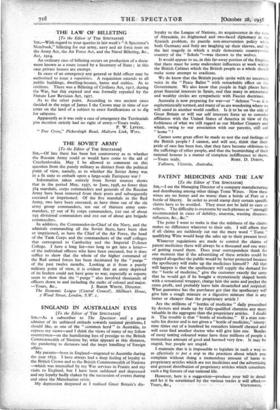PATENT MEDICINES AND THE LAW [To the Editor of THE
SPECTATOR] SIR,—I am the Managing Director of a company manufacturing and distributing among other things Tonic Wines. Now these wines are no better and no worse than a b•Sttle of Port or a bottle of Sherry. In order to avoid stamp duty certain specific claims have to be avoided. They must not be held to cure or relieve. The difficulty is overcome by such phrases as " strongly recommended in cases of debility, anaemia, wasting diseases, influenza, &c., &c."
The point I want to make is that the mildness of the claims makes no difference whatever to their sale. I will affirm that if all claims are ruthlessly cut out the mere word " Tonic " qualifying Wine would keep the sales up to their present level.
Whatever regulations are made to control the claims of patent medicines there will always be a thousand and one ways of getting round them. Does your correspondent think for one moment that if the advertising of these articles could be stopped altogether the public would be better protected because the apothecary will make up the medicines himself ? All that will happen is that the apothecary will supply the demand for the " bottle of medicine," give the customer exactly the same that he would get if he bought a mysteriously shaped bottle with a sensational wrapper, charge him the same and 'pocket the extra profit, and probably leave him dissatisfied and sceptical. What guarantee has the purchaser got that the apothecary will give him a cough mixture or a digestive mixture that is any better or cheaper than the proprietary article ?
Are the millions of " bottles of medicine " daily prescribed by doctors and made up by fully-qualified chemists any more valuable in the aggregate than the proprietary articles. I doubt it. The trouble is that " bottle of medicine." If a man con- sults his doctor and is not given a " bottle of medicine," ninety- nine times out of a hundred he considers himself cheated and will soon find another doctor who will give him one. Bottles of nasty tasting coloured water have done millions of people a tremendous amount of good and harmed very few. It may be stupid, but people are stupid.
I maintain that it is impossible to legislate in such a way so as effectively to put a stop to the practices about which you complain without doing a tremendous amount of harm tc proprietary articles which are not medicines and the advertising and general distribution of proprietary articles which constitute such a big feature of our national life.
However, here is a suggestion—produce your bill in detail and let it be scrutinised by the various trades it will affect.—
























































 Previous page
Previous page